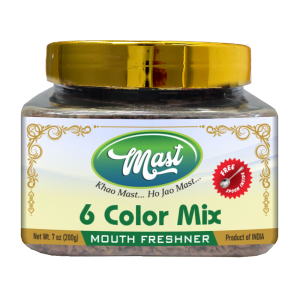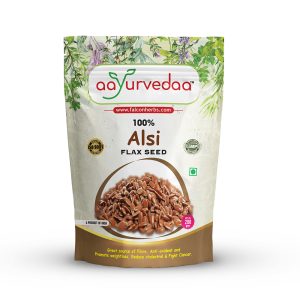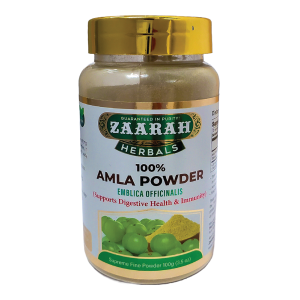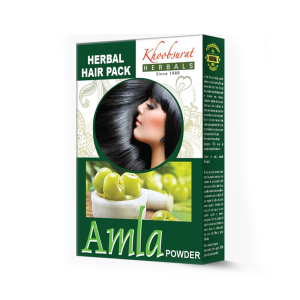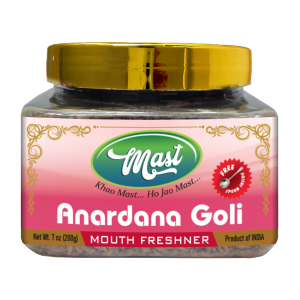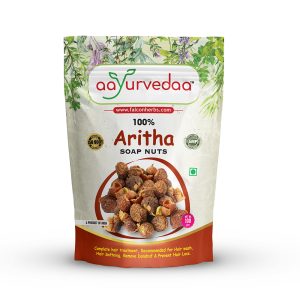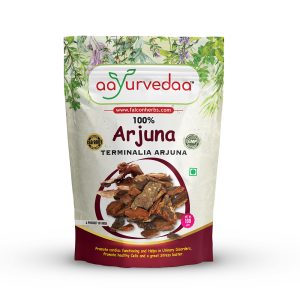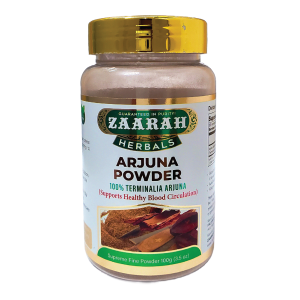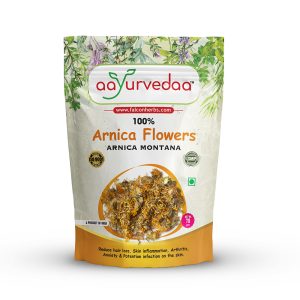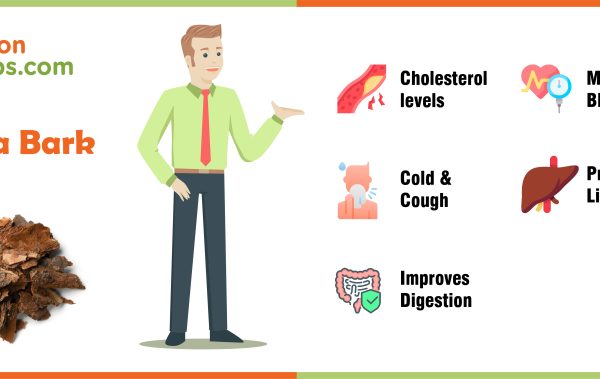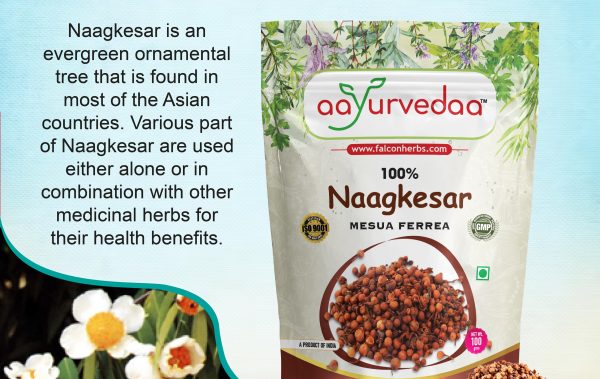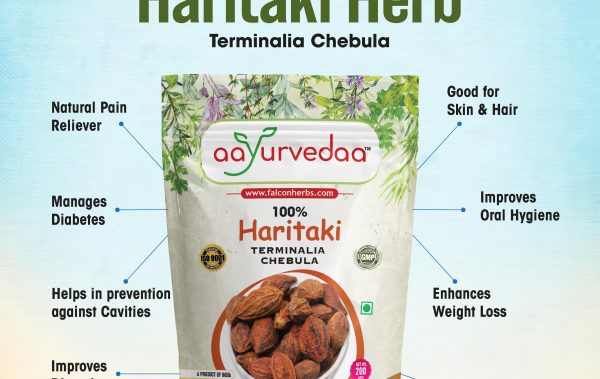No products in the cart.
5 Powerful Potential Benefits Uses, of Mulethi Sticks | Liquorice Sticks : Supporting Your Kidney, Liver, and Bladder Health
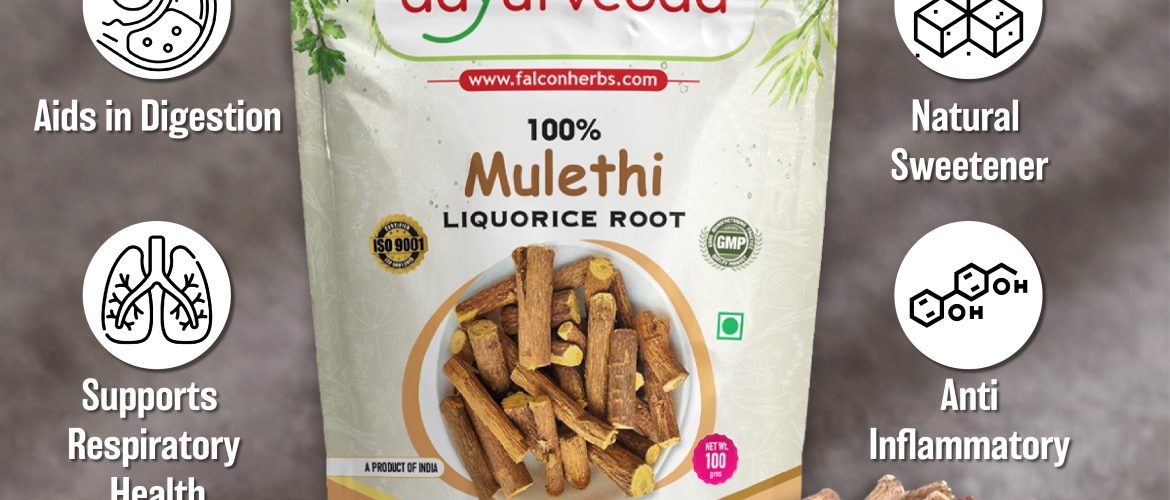
Aayurvedaa Liquorice Sticks | Mulethi Sticks is an ayurvedic medicine that supports the respiratory system and relieves cough and bronchitis. It can aid digestion while also protecting the liver. It may help with weight loss. Aayurvedaa Mulethi Sticks are utilised for their stomach relaxing and healing properties. It aids in the restoration of the stomach lining, which may have been worn owing to inflammatory action.
It is also utilised in many homes because of its anti-ageing qualities. Mulethi benefits include relieving people suffering from the problem of depression. Including licorice root in your daily diet, helps in controlling stress hormones, reducing depression, anxiety and stress.
Table of Contents
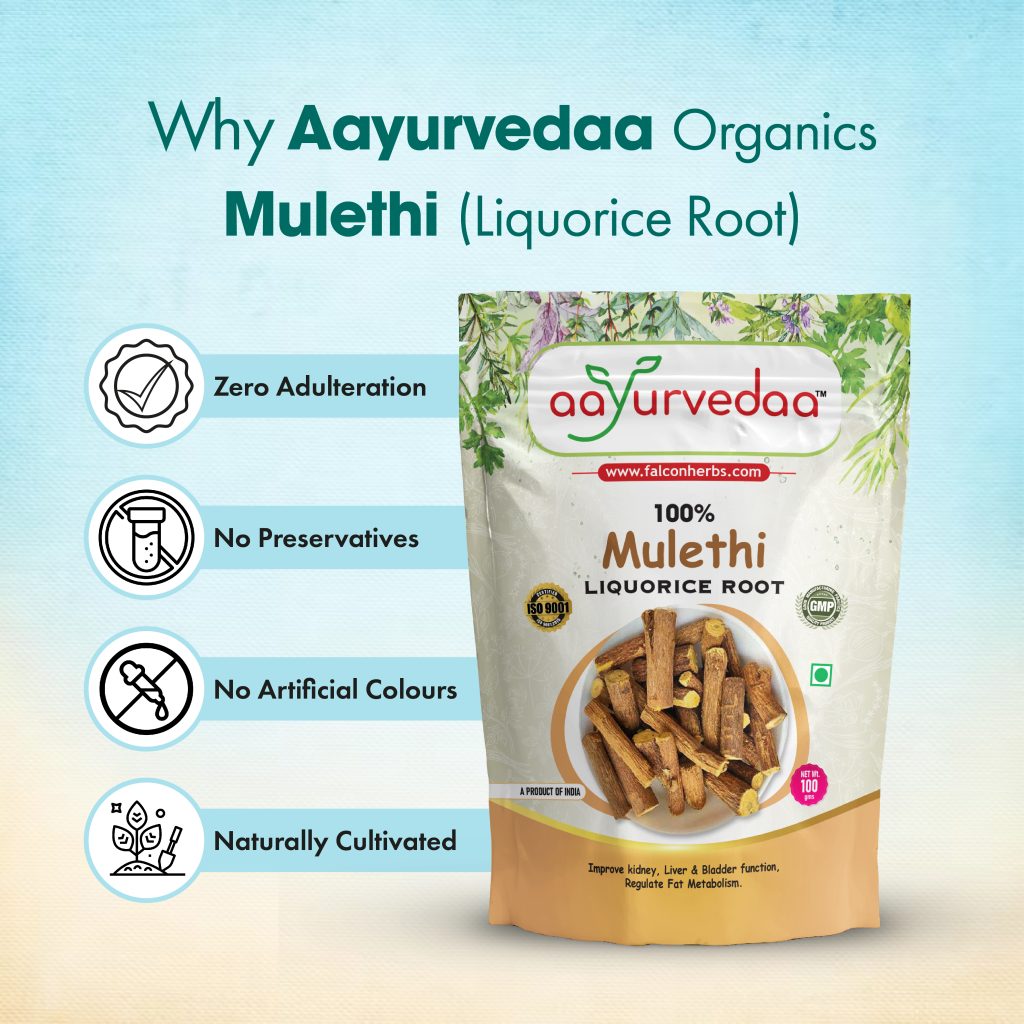
Liquorice Root, also commonly known as licorice root, is derived from the Glycyrrhiza glabra plant – a perennial legume native to Southern Europe and parts of Asia. This unique root has a long and fascinating history, with records of its use dating back thousands of years across various cultures. It has been valued not only for its distinctive sweet, slightly anise-like flavor but also for its wide range of traditional medicinal applications.
Benefits Of Liquorice Sticks | Mulethi Sticks :
1. Digestive Aid
Traditional medicine systems like Ayurveda have long utilized liquorice Sticks for its soothing effects on the stomach and digestive tract. Here’s how it might help:
- Ulcer Relief: The glycyrrhizin compound in liquorice Sticks may promote the production of protective mucus lining in the stomach, potentially aiding in the healing of stomach ulcers.
- Heartburn and Acid Reflux: Liquorice Sticks could help reduce acid reflux and heartburn symptoms, possibly due to its anti-inflammatory and soothing properties.
- General digestive support: Some studies suggest that liquorice Stickscan promote healthy digestion and relieve occasional constipation.
2. Soothes Sore Throats and Coughs
Liquorice Root has been a go-to remedy for sore throats and respiratory discomforts for generations. Here’s why it might offer relief:
- Anti-inflammatory Action: Containing potential anti-inflammatory compounds, liquorice Sticks may help reduce inflammation in the throat, providing relief from soreness and irritation.
- Cough Suppressant It’s thought to have expectorant properties, promoting the thinning of mucus and easing coughs.
- Soothing Effect: The natural sweetness and slightly viscous texture of liquorice tea may create a coating effect on the throat, offering temporary relief.
3. Antioxidant and Anti-Inflammatory Powerhouse
Liquorice Sticks | Mulethi Sticks boasts a rich array of antioxidants and anti-inflammatory compounds, including glycyrrhizin, which contribute to its potential health benefits:
- Protection against Cellular Damage: Antioxidants help fight against harmful free radicals, potentially helping to lower risks of chronic diseases and reducing cellular damage.
- Inflammation Reduction: The anti-inflammatory properties of liquorice Sticks may offer benefits in managing conditions like arthritis or certain skin conditions like eczema.
- Potential for Viral Protection: Early research points to potential antiviral activities of liquorice Sticks extracts against certain viruses.
4. Liver Support
Some studies suggest a protective role for liquorice root in maintaining liver health. While more research is required, it may offer these potential benefits:
- Reduced Liver Inflammation: Liquorice Sticks | Mulethi Sticks could help lower inflammation linked to some liver diseases.
- Detoxification Support: It might help support natural liver detoxification processes and protect against the effects of harmful toxins.
5. Other Investigated Benefits
Research is ongoing to explore other potential benefits of liquorice Sticks, including:
- Oral Health: Liquorice root | Mulethi Sticks might have antimicrobial properties that could help protect against plaque and cavities and reduce bad breath.
- Hormonal Regulation: Preliminary research suggests a potential role for liquorice Sticks | Mulethi Sticks in managing some symptoms of menopause or polycystic ovary syndrome (PCOS).
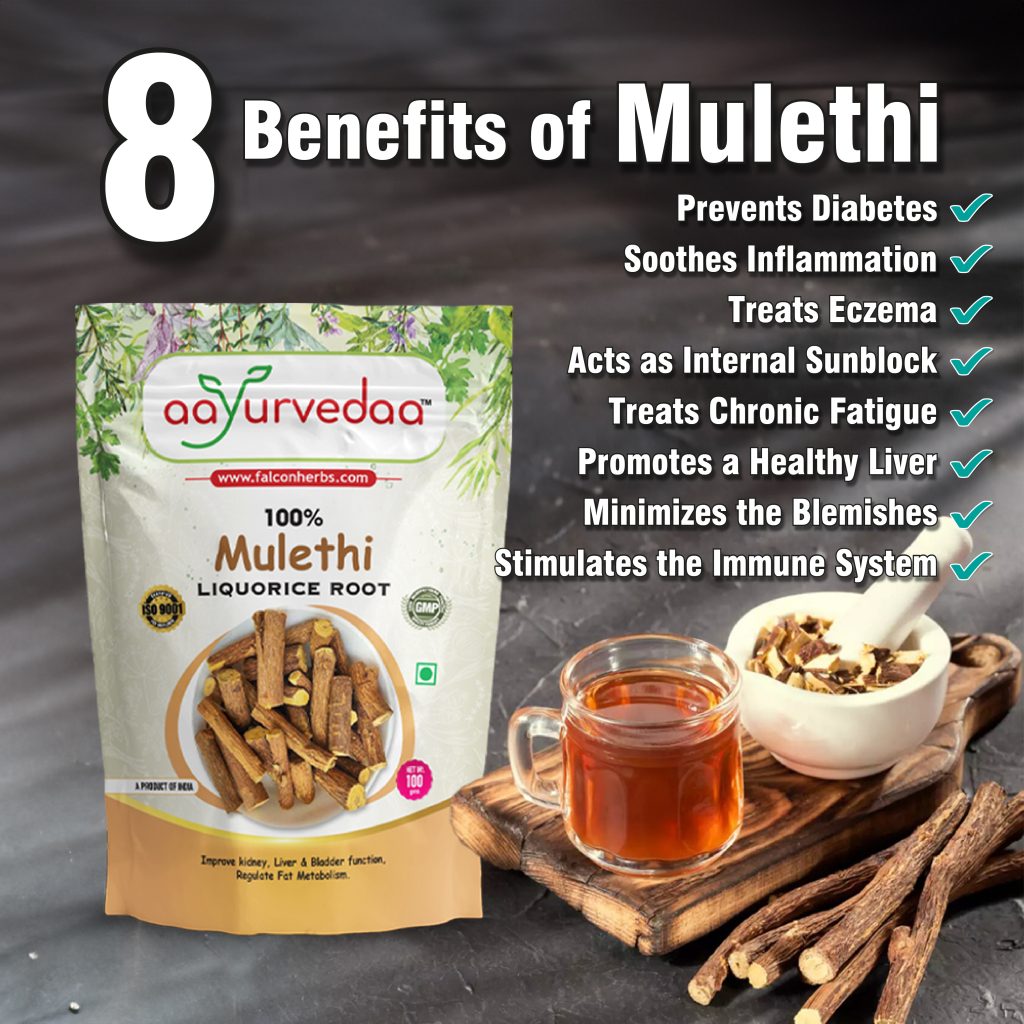
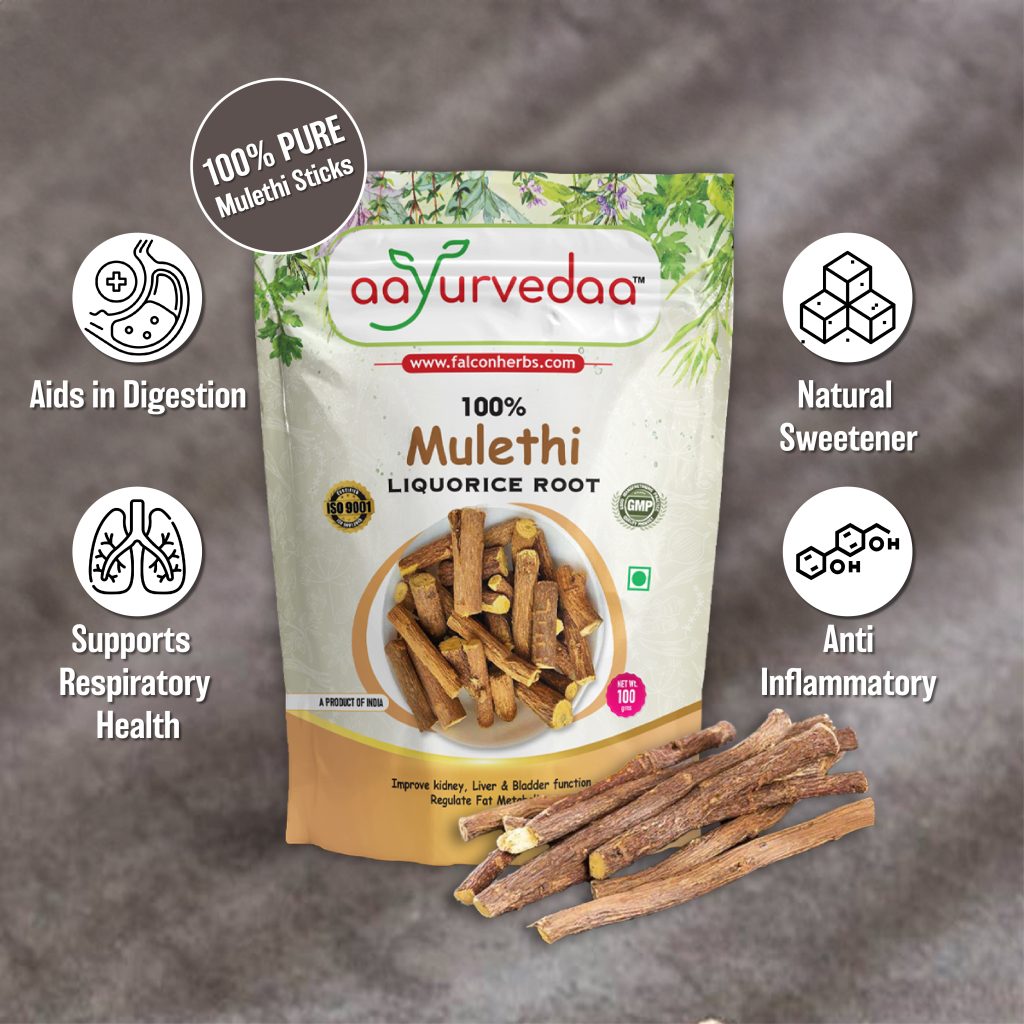
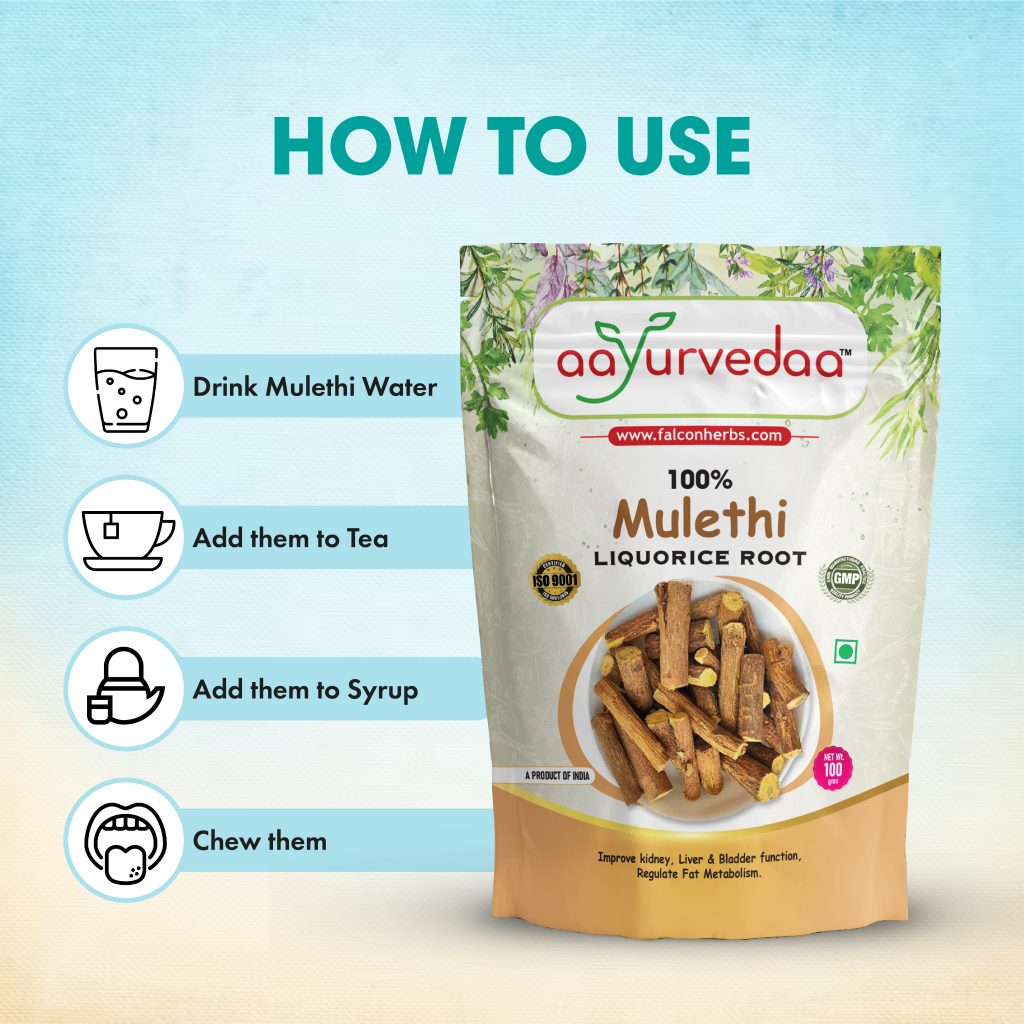
Uses Of Liquorice Sticks | Mulethi Sticks :
1. Culinary Adventures
- Flavoring Agent: The naturally sweet and slightly anise-like flavor of liquorice makes it a popular ingredient in candies, beverages, syrups, and even tobacco products. You’ll find it in many classic licorice candies, herbal teas, and as a subtle addition to savory dishes.
- Chewable Treat: Dried liquorice sticks offer a satisfying chew with a burst of sweetness. They can be enjoyed by both children and adults for a nostalgic snack.
2. Traditional Medicine and Wellness Practices
- Digestive Support: Liquorice sticks have been used for centuries to soothe upset stomachs, reduce heartburn, and potentially aid in ulcer healing. This is likely due to its anti-inflammatory properties and ability to increase mucus production within the digestive tract.
- Sore Throat Soother: Liquorice root tea, prepared from raw sticks, is a traditional remedy for sore throats, coughs, and respiratory irritations. It’s believed to help reduce inflammation and provide a soothing, slightly numbing effect.
- Skin Care: Some topical preparations incorporate liquorice extracts for their antioxidant, anti-inflammatory, and potential skin-brightening properties.
- Ayurvedic Medicine: Liquorice root plays a significant role in Ayurvedic medicine, where it is valued for its wide-ranging potential benefits and adaptogenic properties (adaptogens are believed to help the body manage stress).
3. Home Remedies and Personal Care
- Breath Freshener: Chewing on liquorice sticks can temporarily freshen breath with its mild anise-like flavor.
- Hair Rinse: Some natural hair care enthusiasts use liquorice root decoctions as a rinse, believing it helps to promote healthy hair and scalp.
- Pest Deterrent: The strong scent of licorice is thought to have a natural repellent effect on certain insects like ants and cockroaches.
4. Modern Research and Potential Applications
While many uses are rooted in traditional practices, modern research continues to explore new avenues for utilizing liquorice root:
- Oral Health: Scientists are investigating the antimicrobial properties of liquorice extracts in relation to reducing plaque, cavities, and fighting bad breath.
- Viral Protection: Early studies suggest potential antiviral effects of liquorice root compounds against certain viruses.
- Liver Support: Researchers are examining a potential role for liquorice in aiding liver health and promoting detoxification pathways.
- Management of Hormonal Conditions: Preliminary research hints at the possibility of liquorice extracts offering some benefits for conditions like menopause and Polycystic ovary syndrome (PCOS).
Important Considerations
- Excessive intake: While offering potential benefits, excessive consumption of liquorice root, especially with extended use, can lead to elevated blood pressure and other side effects due to the glycyrrhizin compound. Moderation is key.
- Deglycyrrhizinated Licorice (DGL): DGL is a form of licorice with much of the glycyrrhizin removed and is generally considered safer for long-term use.
- Potential Interactions: Consult a doctor before using liquorice root if you have existing medical conditions or are taking medication, as there can be potential interactions.
Harnessing the Power of Liquorice Root
Liquorice root is available in various forms, offering versatility in its use:
- Raw root: The dried root can be chewed for its natural flavor or used to make teas and decoctions.
- Powder: Ground into a powder, it can easily be added to smoothies, beverages, or incorporated into recipes for a boost of flavor and potential health benefits.
- Capsules and Supplements: Standardized liquorice root extracts are available in capsules or supplement forms.
- Topical Use: Liquorice root extracts can be found in skin creams and ointments intended for managing skin conditions.

